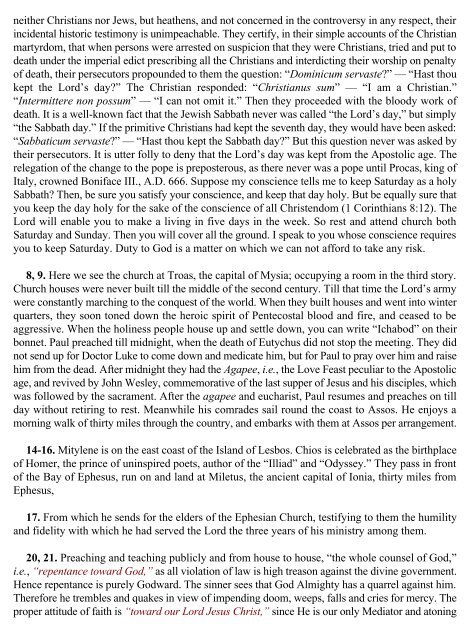Godbey's Commentary - Acts - Romans - Enter His Rest
Godbey's Commentary - Acts - Romans - Enter His Rest
Godbey's Commentary - Acts - Romans - Enter His Rest
You also want an ePaper? Increase the reach of your titles
YUMPU automatically turns print PDFs into web optimized ePapers that Google loves.
neither Christians nor Jews, but heathens, and not concerned in the controversy in any respect, their<br />
incidental historic testimony is unimpeachable. They certify, in their simple accounts of the Christian<br />
martyrdom, that when persons were arrested on suspicion that they were Christians, tried and put to<br />
death under the imperial edict prescribing all the Christians and interdicting their worship on penalty<br />
of death, their persecutors propounded to them the question: “Dominicum servaste?” — “Hast thou<br />
kept the Lord’s day?” The Christian responded: “Christianus sum” — “I am a Christian.”<br />
“Intermittere non possum” — “I can not omit it.” Then they proceeded with the bloody work of<br />
death. It is a well-known fact that the Jewish Sabbath never was called “the Lord’s day,” but simply<br />
“the Sabbath day.” If the primitive Christians had kept the seventh day, they would have been asked:<br />
“Sabbaticum servaste?” — “Hast thou kept the Sabbath day?” But this question never was asked by<br />
their persecutors. It is utter folly to deny that the Lord’s day was kept from the Apostolic age. The<br />
relegation of the change to the pope is preposterous, as there never was a pope until Procas, king of<br />
Italy, crowned Boniface III., A.D. 666. Suppose my conscience tells me to keep Saturday as a holy<br />
Sabbath? Then, be sure you satisfy your conscience, and keep that day holy. But be equally sure that<br />
you keep the day holy for the sake of the conscience of all Christendom (1 Corinthians 8:12). The<br />
Lord will enable you to make a living in five days in the week. So rest and attend church both<br />
Saturday and Sunday. Then you will cover all the ground. I speak to you whose conscience requires<br />
you to keep Saturday. Duty to God is a matter on which we can not afford to take any risk.<br />
8, 9. Here we see the church at Troas, the capital of Mysia; occupying a room in the third story.<br />
Church houses were never built till the middle of the second century. Till that time the Lord’s army<br />
were constantly marching to the conquest of the world. When they built houses and went into winter<br />
quarters, they soon toned down the heroic spirit of Pentecostal blood and fire, and ceased to be<br />
aggressive. When the holiness people house up and settle down, you can write “Ichabod” on their<br />
bonnet. Paul preached till midnight, when the death of Eutychus did not stop the meeting. They did<br />
not send up for Doctor Luke to come down and medicate him, but for Paul to pray over him and raise<br />
him from the dead. After midnight they had the Agapee, i.e., the Love Feast peculiar to the Apostolic<br />
age, and revived by John Wesley, commemorative of the last supper of Jesus and his disciples, which<br />
was followed by the sacrament. After the agapee and eucharist, Paul resumes and preaches on till<br />
day without retiring to rest. Meanwhile his comrades sail round the coast to Assos. He enjoys a<br />
morning walk of thirty miles through the country, and embarks with them at Assos per arrangement.<br />
14-16. Mitylene is on the east coast of the Island of Lesbos. Chios is celebrated as the birthplace<br />
of Homer, the prince of uninspired poets, author of the “Illiad” and “Odyssey.” They pass in front<br />
of the Bay of Ephesus, run on and land at Miletus, the ancient capital of Ionia, thirty miles from<br />
Ephesus,<br />
17. From which he sends for the elders of the Ephesian Church, testifying to them the humility<br />
and fidelity with which he had served the Lord the three years of his ministry among them.<br />
20, 21. Preaching and teaching publicly and from house to house, “the whole counsel of God,”<br />
i.e., “repentance toward God,” as all violation of law is high treason against the divine government.<br />
Hence repentance is purely Godward. The sinner sees that God Almighty has a quarrel against him.<br />
Therefore he trembles and quakes in view of impending doom, weeps, falls and cries for mercy. The<br />
proper attitude of faith is “toward our Lord Jesus Christ,” since He is our only Mediator and atoning
















